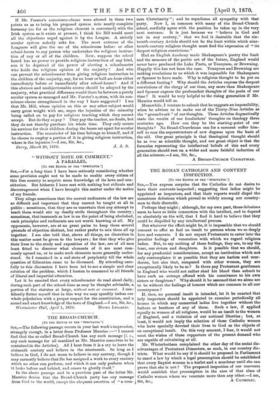THE BROAD-CHURCH.
[TO THE EDITOR OF THE "SPECTATOR."]
Sza,—The following passage occurs in your last week's impression, strangely enough, in a letter from Professor Maurice :—" I cannot find that the so-called Broad-Church has any such message [i. e., any such message for all mankind as Mr. Maurice conceives to be contained in the Articles]. All I hear from it is a cry to leave the sixteenth century and believe in the nineteenth. So long as I believe in God, I do not mean to believe in any century, though I may earnestly believe that He has assigned a work to every century which no other can perform, and which it can only perform when it looks before and behind, and ceases to glorify itself."
In the above passage and in a previous part of the letter Mr. Maurice denies that the Broad-Church party has any message from God to the world, except the eloquent assertion of "a com-
mon Christianity" ; and he repudiates all sympathy with that party. Now 1, in common with many of the Broad-Church school, cordially agree with the position he takes up in the very next sentence. It is just because we "believe in God and not in any century," that we feel it desirable that the six- teenth-century Article should not be the limit within which nine- teenth-century religious thought must find the 'expression of "its deepest religious convictions."
Had an English Academy made Shakespeare's poetry the limit and the measure of the poetic art of the future, England would never have produced the Lake Poets, or Tennyson, or Browning. Happily this has not been the case. Tennyson and Browning are making revelations to us which it was impossible for Shakespeare or Spenser to have made. Why is religious thought to be put on a different footing? Why should the Articles express the deepest convictions of the clergy of our time, any more than Shakespeare and Spenser express the profoundest thoughts of the poets of our time ? It would be very helpful to the rising generation if Mr. Maurice would tell us.
Meanwhile, I venture to submit that he suggests an impossibility, when he advises us to make use of the Thirty-Nine Articles as the " groundwork " of our thoughts. These Articles dogmatically state the results of our forefathers' thoughts on theology three centuries ago. How can they be the starting-point of our thoughts? No Broad-Churchman can for a moment suffer him- self to rear the superstructure of new dogmas upon the basis of the old. Our great principle is that theological thought should be as true as scientific thought, and our great object is that the formulas representing the intellectual beliefs of this and every generation should rest on a wider and more faithful induction of all the sciences.—I am, Sir, &c.,
A BROAD-CHURCH CLERGYMAN.


































 Previous page
Previous page